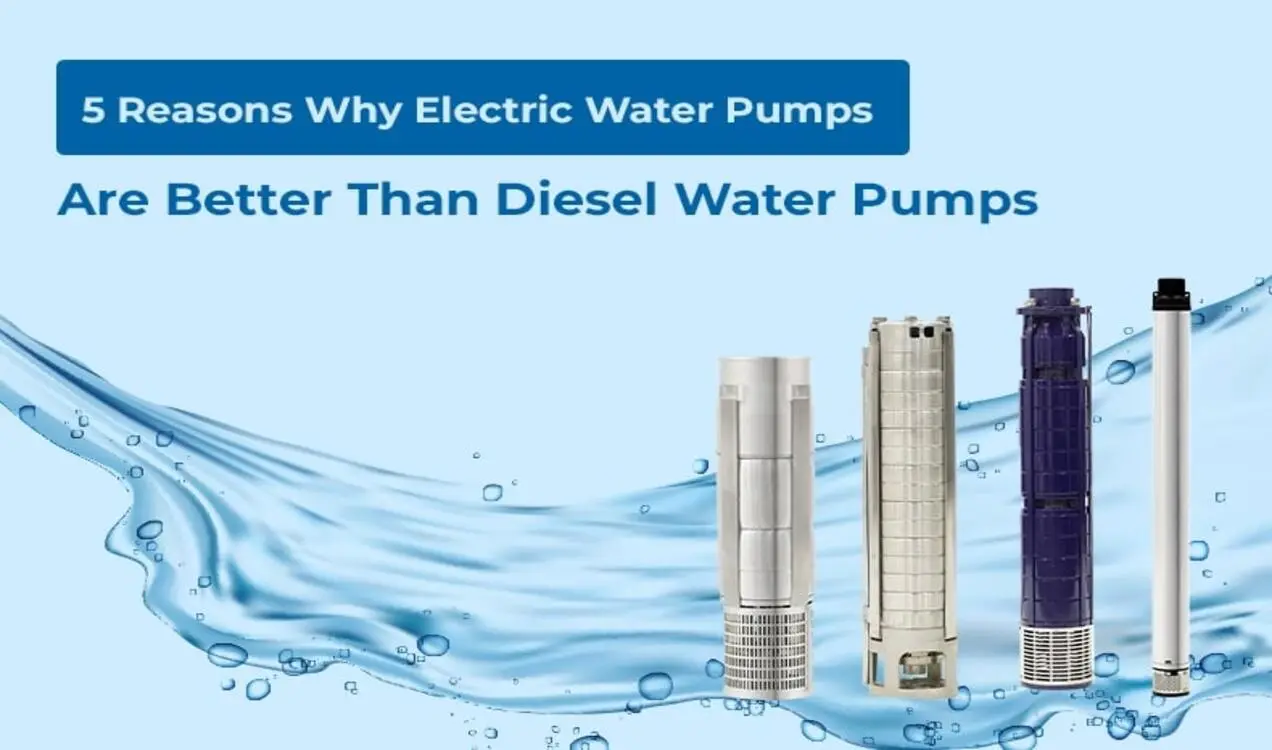Often, engineers struggle with the decision, as to which one to install a diesel water pump or electric water pump for de-watering the pipeline or for on-site work.
Earlier, cost estimation of a de-watering job was easy. However, with the increasing fuel prices globally, now the verdict between diesel and electric motors has become prominent.
Although an electric submersible pump is cheaper than diesel, there are several other factors to consider for making a purchase decision.
Did you Know?
Agricultural Resource Management (ARM) reports that farm irrigation pumps consume 70 -80% of the total electric energy used on a farm. Today, most farmers use diesel pumps for irrigation because of their high durability. However, over the last decade, farmers are aggressively switching to electric water pumps.
Wondering why this change? Read on to find out more.
Reasons why Electric Pumps are better than Diesel Pumps
Cost
Electrical Pump
With the right infrastructure (electric pole and wires) installed, operating an electric pump is convenient.
Although, the cost of electricity varies across states and consumption rates. It’s wise to operate an electrical pump with a shorter connection to the grid power supply. For instance, the peak hours will consume more wattage and hence the per-unit price will be high. Additionally, the tariff rates increase at regular intervals. Else, swapping it with a diesel pump makes sense, if you want to reduce your energy bills.
Diesel Pump
With constantly fluctuating fuel prices usually on the higher side, diesel pump proves to be a costlier option; especially considering the horsepower and size of the installed pump. Maintenance costs including controls installation are an additional burden on the user.
Verdict: The average electricity cost ranges between $150 – $250/MWh. However, the diesel pump may cost twice as much as an electric generator.
Pump Control
Pump controls and variable speed controls are easier to install on an electric motor than diesel. Although, these controls can be installed on the diesel pump but can reduce the pump’s efficiency and proves costlier.
If the pump controls and variables are installed correctly, the electrical pump motor offers greater efficiency and durability, enhanced control in canals and pipelines, and reduced energy usage.
To mitigate power surges in the motor components like soft starters and variable speed drives help. Further, the pump can be automated for remote control, which helps to monitor the consumption easily and decrease the cost.
High Altitude
Altitude plays a pivotal role in the performance of diesel water pumps. High altitude supports low pressure, which negatively impacts the performance of diesel and gas pumps. Subsequently, these pumps struggle to operate with equal efficiency as they deliver at sea level. Further at higher altitudes, the oxygen level is thinner, hence a wider throttle opening in the diesel pump is required to consume adequate air level. Resultantly, more fuel is burnt leading to increased operational costs.
Altitude does not impact the electrical pump, as atmospheric pressure is not a concern. Regardless of altitude level, the electric motor operates at optimal capacity to deliver higher performance at no additional fuel cost.
Environmental Impact
With deteriorating environmental conditions in the recent past, people and companies have become conscious to use cleaner or greener energy resources and equipment.
With that said, using fossil fuels such as diesel to operate water pumps only aggravates the environmental problem, due to the emission of greenhouse gasses. Therefore, it’s wise to replace it with eco-friendly electric pumps, as it’s sourced from natural and renewable resources – wind, solar, and water. Further, diesel-operated pumps should be avoided in areas that are prone to explosion or contamination, such as wildlife reserves or water spills.
Electrical pumps offer 50-85% efficiency and generate lower carbon emissions as compared to diesel which offers 20-35% efficiency. Further, tractors often operate on diesel, contributing more to air pollution and global warming. Hence, it’s wise to opt for an electrical pump over diesel, if you seek to contribute to the environment.
You can also read this blog: Understand the Working Principle of Electric Water Pumps
Maintenance and Reliability
Electrical Pump
With low labor requirements, and Electric pump is popular among consumers. The motor doesn’t need regular maintenance, such as frequent oil and filter checks and replacement, and refueling. It only requires lubrication once each quarter of a year. Further, the pump easily integrates with digital systems, such as Variable Frequency Drives (VFD) controls. Hence, it can be monitored, operated, and controlled from a remote location.
Diesel Pump
Since the pump can operate for a longer duration at higher speeds, hence the need for refueling and maintenance is high. However, a higher horsepower range and extensive water availability make diesel pumps a valuable option for several farmers. Additionally, the technology used is highly user-friendly.
Conclusion
For optimal performance and cost-efficiency installing the precise pump is important. With dewatering occurring on construction sites, a diesel water pump is highly efficient. However, considering the environmental impact and rising cost of fuel, an electrical submersible pump proves to be a better option.
Looking to purchase Submersible pumps? Click here to find a large variety of Submersible water at Unnati submersible pumps.


